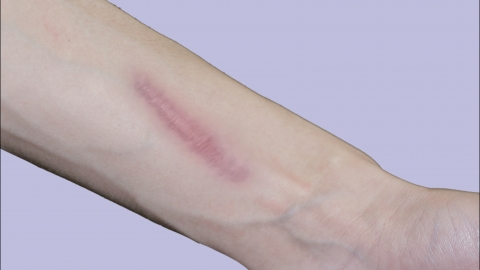How to Repair and Flatten Depressed Scars
Depressed scars may be caused by age-related factors, individual differences, burns, trauma, acne, and other factors, and can be repaired according to different situations. It is recommended to seek medical attention promptly and undergo treatment under the guidance of a doctor.

1. Age-related factors: With aging, the skin's elasticity and regenerative capacity decrease, making it more prone to depressed scarring after injury. Try using skincare products containing ingredients such as vitamin C, vitamin E, and hyaluronic acid to help improve skin elasticity and promote collagen production.
2. Individual differences: Each person's skin healing ability varies; some individuals may have less effective innate skin repair mechanisms, leading to a tendency to develop depressed scars after injuries. For depressed scars caused by individual differences, follow medical advice to use treatments such as microneedling, laser therapy, or dermal filler injections to stimulate collagen production and improve uneven skin texture.
3. Burns: Burns, especially deep burns, can damage the dermis and subcutaneous tissues, significantly affecting the normal synthesis and distribution of collagen, leading to depressed scarring after healing. Early wound management should be performed to prevent infection and promote wound healing. Later, pressure therapy, silicone sheeting, and laser therapy can be used to reduce scar formation.
4. Trauma: Severe trauma, such as impact injuries or cuts, may cause deep tissue damage to the skin, resulting in depressed scarring after healing. Initial wound management should be performed to prevent infection and promote healing. Later, laser therapy, microneedling, or dermal filler injections may be used to improve the scar.
5. Acne: Acne is generally associated with poor habits and infections. Severe acne inflammation can damage deep skin tissues, leading to depressed scarring after healing, which may be accompanied by symptoms such as redness, pain, and pus-filled bumps. For depressed scars caused by acne, it is recommended to follow medical advice to use medications such as doxycycline hyclate tablets, minocycline hydrochloride tablets, or clindamycin gel for treatment. Once the acne inflammation is controlled, medical treatments such as microdermabrasion, chemical peels, or laser therapy may be used to improve the scar.
Repair of depressed scars requires selecting appropriate methods based on the specific characteristics of the scar. During the healing process, it is important to follow the doctor's recommendations and guidance to ensure the safety and effectiveness of the treatment.





